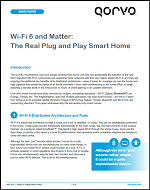Matter™ Gets Everybody “Talking”
January 26, 2021
There's a new standard in town and its name is – Matter™. It aims to elevate consumers' smart home experiences by making products more compatible. Up until now, we’ve had a range of protocols – Wi-Fi, Zigbee, Bluetooth® Low Energy, Thread, etc. Most smart home products support just one or two of these wireless standards but not all. That's where Matter comes in. It brings all of the protocols into one overarching standard. This makes it much easier for consumers to pick and choose their smart home devices based on other merits outside of interoperability, so they can get the rich experience they're yearning for.
 Networking ecosystems cohabitate: Matter is an aggregation standard that brings together existing IoT standards
Networking ecosystems cohabitate: Matter is an aggregation standard that brings together existing IoT standards
Great news for consumers but what does it mean for you – the designer of smart home devices? Well, it's great news for you too. Matter, brought to you by the Connectivity Standards Alliance (CSA), and supported by the likes of Apple, Amazon, Google, Samsung and others, is an open-source approach that promises to simplify and speed up development time for manufacturers to get smart home devices to market faster.
Matter and Wi-Fi 6: The Essentials for a Truly Smart Home
In addition to Matter, Wi-Fi 6 plays a vital role in smart home success. The primary benefits of Wi-Fi 6 are twofold: to increase device performance and to handle the connection of a number of devices. The latter is important in advancing the smart home. Not only can it connect a host of devices, but many of the devices can also act as a “pod,” which distributes the signal throughout the home. The results: close proximity to the router is no longer necessary and many dead zones are eliminated.
This distributed network (Wi-Fi 6 and pods) connects the end devices – temperature, security and lighting sensors, printers, appliances, computers, TVs, etc. These devices will communicate with the pods, and through the pods to the router and then to the internet. With Matter used in the development of Wi-Fi 6 routers, pods and other devices, the entire network can communicate, and offer better performance and security. What's more: the end devices do not have to support meshing capabilities themselves anymore. Given they are always in range via the pods, the cost and the design complexity of these IoT end-devices is reduced, while enabling sleeker and smaller, less obtrusive designs with longer battery life.
Do you want to learn more? I've written a white paper, Wi-Fi 6 and Matter: The Real Plug and Play Smart Home, that takes a deeper dive into Matter and other technologies that enable the smart home.
Qorvo also has award winning products with these capabilities. View the table below:
| Part Number | Applications | Protocols |
|---|---|---|
| QPG6095 | Smart Home Devices |
802.15.4, Zigbee 3.0, Zigbee Green Power, Thread, Bluetooth® Low Energy |
| QPG6100 | Connected Lighting Smart Home Sentrollers | Bluetooth® Low Energy Zigbee Thread |
The Bluetooth® word mark and logos are registered trademarks owned by Bluetooth SIG, Inc. and any use of such marks by Qorvo US, Inc. is under license. Other trademarks and trade names are those of their respective owners.
Have another topic that you would like Qorvo experts to cover? Email your suggestions to the Qorvo Blog team and it could be featured in an upcoming post. Please include your contact information in the body of the email.

